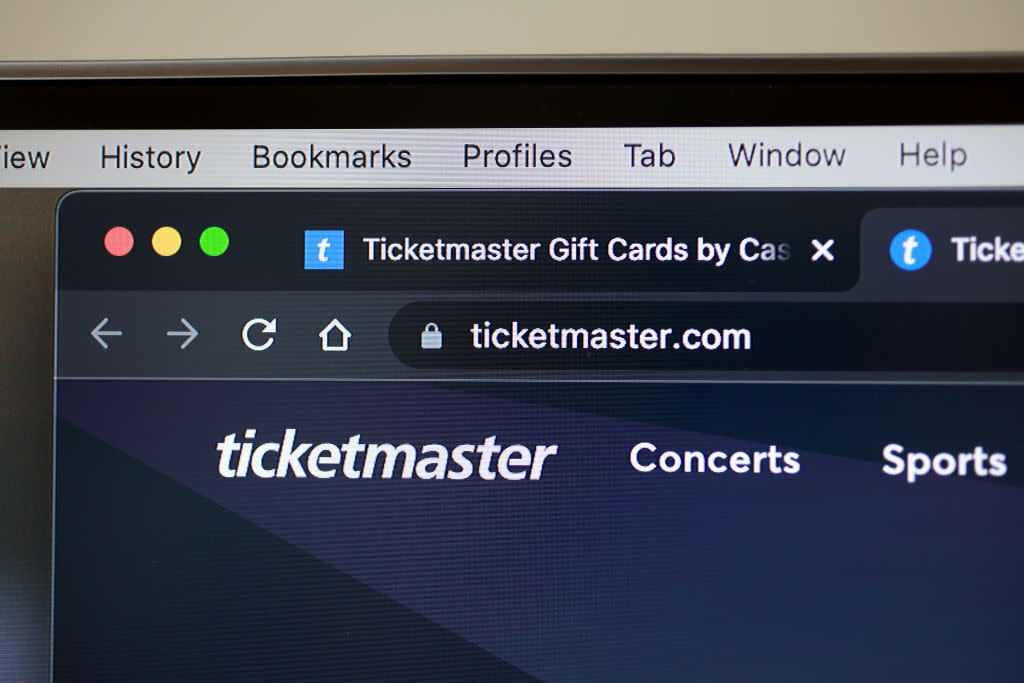West Virginia joins Department of Justice antitrust suit against Live Nation

In this photo illustration, a Ticketmaster website is shown on a computer screen on November 18, 2022 in Miami, Florida. (Joe Raedle | Getty Images)
West Virginia is one of 29 states along with Washington D.C. that have signed onto an antitrust lawsuit against Live Nation, the owner of Ticketmaster, alleging the company stifled competition by monopolizing significant markets of the entertainment industry.
The lawsuit was spearheaded by the U.S. Department of Justice and filed in the U.S. District Court for Southern District of New York.
Live Nation merged with Ticketmaster in 2010, creating a “behemoth organization” in the live event ticketing market that controls 80% of primary ticket sales in the U.S., West Virginia Attorney General Patrick Morrisey’s office said in a news release Thursday.
“Competition is the driving force in a free market economy, and those who resort to improper means will be held accountable to the full extent of the law,” Morrisey said. “Companies should not resort to sinister schemes to control the market, all the while hurting consumers. Such predatory practices inflate prices and come at a tremendous cost.”
“The more choices consumers have the better for them to make informed decisions on which company to use,” he said.
The lawsuit comes about two years after technical issues with Ticketmaster botched the sale of tickets to Taylor Swift’s 2022 Eras tour.
In a news conference Thursday, U.S. Attorney General Merrick Garland noted that in recent years Live Nation has been criticized by artists and fans alike for “exorbitant fees and technological failures.”
“But we are not here today because Live Nation and Ticketmaster’s conduct is inconvenient or frustrating,” Garland said. “We are here because, as we allege, that conduct is anticompetitive and illegal. Our complaint makes clear what happens when a monopolist dedicates its resources to entrenching its monopoly power and insulating itself from competition rather than investing in better products and services.”
The lawsuit alleges that Live Nation harmed fans through higher fees and limited the amount of information fans have about the ultimate cost of seeing a show. It also says the company maintained its monopoly by locking up venues through restrictive long-term, exclusive agreements and threats that venues will lose access to tours and artists if they sign with a competing ticketer and leveraged its network of venues to force artists to select Live Nation as a promoter instead of rivaling companies.
The lawsuit seeks to secure financial compensation for fans who were overcharged by the company, prohibit the company from engaging in anti-competitive practices and order Live Nation to divest Ticketmaster.
In a statement on the company’s website, Live Nation argued that there is more competition than ever in the live music market and that Live Nation’s market share has declined since 2010.
“The complaint — and even more so the press conference announcing it — attempt to portray Live Nation and Ticketmaster as the cause of fan frustration with the live entertainment industry,” the statement reads. “It blames concert promoters and ticketing companies — neither of which control ticket prices — for high ticket prices. It ignores everything that is actually responsible for higher ticket prices, from increasing production costs to artist popularity, to 24/7 online ticket scalping that reveals the public’s willingness to pay far more than primary tickets cost.
“It blames Live Nation and Ticketmaster for high service charges, but ignores that Ticketmaster retains only a modest portion of those fees,” the statement continues. “In fact, primary ticketing is one of the least expensive digital distributions in the economy.”
GET THE MORNING HEADLINES DELIVERED TO YOUR INBOX
The post West Virginia joins Department of Justice antitrust suit against Live Nation appeared first on West Virginia Watch.
